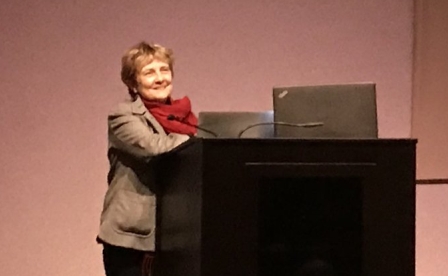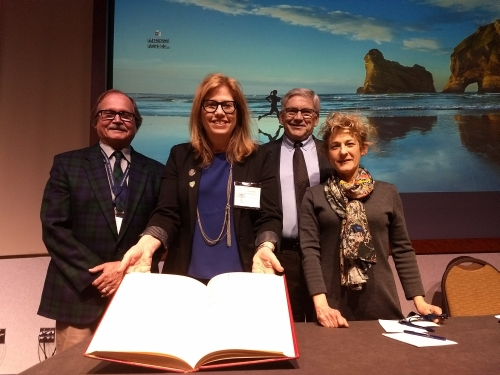
Margot Fassler delivers the Presidential Address (photo by Andrew Kraebel)
The 2018 Annual Meeting (Emory University, 1-3 March) was a great success, with around 350 attendees, four plenary sessions, more than 200 papers, receptions surrounded by a full-scale reproduction of the Bayeux Embroidery, and a closing planetarium field trip where we experienced Hildegard of Bingen’s Scivias as never before. The full program is available here.
The opening plenary, “Materials from the Margins: Islamic Connections as Pre-Mongol Globalism” was delivered by Finbarr Barry Flood (New York University), who discussed how traces of Mongol culture find their way into Islamic art on the western “fringes” of the Mongol empire. MAA President Margot Fassler (Univ. of Notre Dame) delivered her plenary lecture on the topic of medieval nuns as liturgists and composers, focusing in particular on sequences, a particularly poetic genre. The Fellows’ Plenary was delivered by Michael McCormick (Harvard Univ.), who dazzled the attendees with his lecture “DNA, Ice Cores, and Digital Humanities: Doing Medieval History and Archaeology in the 21st Century,” in which he demonstrated how recent developments in forensic anthropology, DNA recovery, ice core analysis, and dendrochronology are helping medievalists recover the stories and voices of the disenfranchised, powerfully combining humanism and science.
The plenary roundtable “Building Inclusivity and Diversity: Challenges, Solutions, and Responses in Medieval Studies” featured seven medievalists of color, some of whom recounted their personal experiences while others described their research into race and racism in the Middle Ages. It is our hope that these ongoing conversations, in combination with several new initiatives (see the Greene Fund below, for example) will help make the Medieval Academy a more welcoming place for all medievalists.
Two K-12 sessions addressed questions of how teachers can integrate medieval studies into their curricula while still adhering to standards and protocols set by the state, and presented ways to involve students in medieval studies through participation in National History Day. The Graduate Student Committee’s roundtable, “A Future Outside of Academia: Alternative Careers for Graduate Students in Medieval Studies,” addressed the pressures of the academic job market and presented ideas for a broader definition of a successful search outcome, for example, in the fields of library science or curatorial work.

Cynthia Hahn is inducted into the Fellows (L-R: Robert Bjork (Scribe), Cynthia Hahn, John Van Engen (President of the Fellows), and Rita Copeland (Orator))
The annual meeting of the Committee on Centers and Regional Associations (CARA) took place on Sunday morning and was attended by thirty CARA delegates, each of whom was there representing their program or department. The morning began with a roundtable on fundraising, a master class in navigating campus funding with Barbara Shailor (Yale Univ.), Margot Fassler (Univ. of Notre Dame), and Robert Bjork (Arizona State Univ.). The roundtable was followed by a discussion and brief updates from each delegate.
A graduate student workshop on the identification, cataloguing, and TEI-transcription of Emory’s fifteenth-century English chronicle scroll took place on campus in the days leading up to the Annual Meeting, a workshop that grew out of the “Digital Editing the Medieval Manuscript Roll/Fragment” workshops previously held at Yale University and University College London among other locales. These workshops were partially funded by seed money from a Medieval Academy/GSC Grant in Innovation. See digitalrollsandfragments.com for more information about this project.
We are extremely grateful to Elizabeth Pastan, James Morey, Jenny Bledsoe, Nicole Corrigan, the Program Committee, the graduate student volunteers, and the staff of the Emory Conference Center and Hotel for their work in organizing and implementing such a splendid meeting. Our thanks as well to Emory University for its support. We look forward to seeing you in Philadelphia next year!



